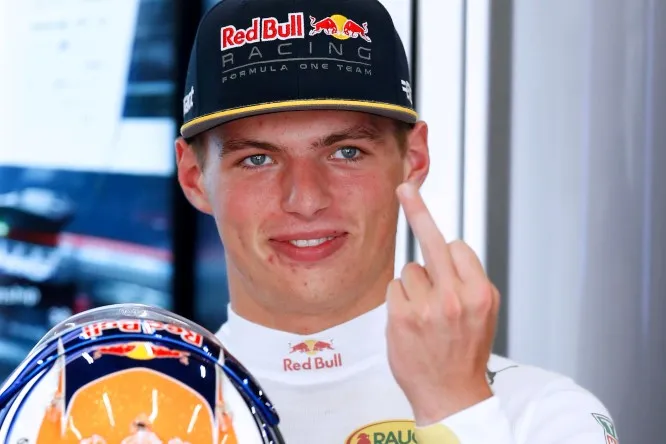Max Verstappen’s middle finger gesture during the Bahrain winter tests on Friday quickly became a hot topic in the Formula 1 paddock. The FIA’s recent crackdown on driver conduct has heightened tensions, and Verstappen’s current penalty points tally has raised concerns about the possibility of a race ban should he accumulate more infractions. However, the incident was later revealed to be a misunderstanding rather than a serious violation.
The Red Bull driver currently has eight penalty points, and with 12 points within a 12-month period resulting in an automatic race ban, Verstappen’s actions are under increased scrutiny. His first two penalty points from the 2024 Austrian Grand Prix incident with Lando Norris will not expire until June 30, keeping him in a precarious position for the upcoming races. Despite this, the FIA has confirmed it will not investigate the middle finger incident, alleviating concerns that Verstappen’s tally would increase.

The situation unfolded when television cameras captured Verstappen leaving the pit lane and seemingly directing an obscene gesture toward the Williams pit wall. Initial speculation suggested that he was expressing frustration toward an intrusive photographer attempting to capture technical details of the Red Bull RB21. However, Motorsport-Total.com later reported that the target of Verstappen’s gesture was actually Luke Browning, a Williams junior driver and personal friend of the Dutchman. What initially appeared to be an act of defiance was, in reality, a playful exchange between two acquaintances.
The FIA has clarified that the incident does not warrant further action, as it occurred while Verstappen was in the car rather than during an official interview or public setting. Furthermore, test sessions do not have officially appointed FIA stewards, further reducing the likelihood of any disciplinary measures being taken. This decision comes amidst ongoing discussions about the FIA’s strict approach to driver behavior, an issue that has sparked controversy among competitors and fans alike.
The governing body’s recent crackdown on inappropriate conduct has been met with widespread criticism. A notable example was the €10,000 fine imposed on World Rally Championship driver Adrien Fourmaux for using explicit language in a television interview. Verstappen himself has also been penalized for similar reasons, having been required to complete “motorsport community service” at the FIA’s annual awards gala in Rwanda after using explicit language during an official press conference at the 2024 Singapore Grand Prix.

The FIA’s rigid stance on driver behavior has led to growing tensions between the organization and the Grand Prix Drivers’ Association (GPDA). FIA President Mohammed Ben Sulayem’s leadership has not been well received in this regard, with many drivers feeling that the governing body is overregulating their conduct. The backlash was evident during the F1 launch event in London, where the FIA received boos from the crowd following a mention by moderator Laura Winter.
Even Verstappen has called for a more pragmatic approach, arguing that while drivers should maintain professionalism, some level of leniency should be exercised, particularly in high-pressure situations. “Honestly, I don’t think it’s necessary to enforce the rules this way. I believe we need a bit of common sense here,” he remarked. He further emphasized that while swearing should not be excessive, drivers should be granted some leeway when emotions run high. “We’re all adults. It shouldn’t be taken so literally,” he added.
The FIA’s stance has not found favor even among senior figures in the paddock. Mercedes team principal Toto Wolff has expressed opposition to the organization’s hardline approach, highlighting the importance of context when evaluating a driver’s language or gestures. “None of us encourage such language, but we must differentiate between genuine insults and spontaneous expressions of frustration,” Wolff stated. He noted that while respect should be maintained toward officials, competitors, and team members, the FIA’s approach risks suppressing the raw emotions that make the sport engaging.

Wolff drew comparisons to other sports, emphasizing that while Formula 1 should uphold professionalism, certain words used in frustration should not warrant punishment. “If the F-word is said out of frustration over one’s own performance or as a spontaneous emotional reaction, that’s one thing. But if it is directed at another driver, an official, or one’s own team, then it is unacceptable and should be prohibited,” he explained. His comments highlight the growing divide between the FIA’s regulatory stance and the perspectives of those within the sport.
As Formula 1 continues to evolve, the FIA faces the challenge of balancing discipline with the raw passion that defines the sport. While maintaining decorum is essential, excessive regulation risks alienating drivers and fans alike. The Verstappen incident serves as a reminder that not every action should be viewed through a punitive lens, and perhaps, as the Dutchman suggests, common sense should play a greater role in shaping the sport’s regulatory framework.




